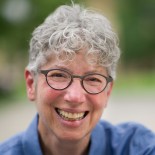Opening Remarks for the Class of 2027
Hello everyone! I am Jill Dolan, the Dean of the College, and I’d like to welcome you as THE GREAT PRINCETON CLASS OF 2027! My colleagues and I are just delighted to address you in this first assembly of your Princeton career.
Everyone today has admired your admission to Princeton. Indeed, it’s notoriously competitive to get into our University, in part because with an entering class of only about 1400 students, our admission slots are limited compared to the number of applications we receive.
I worry, however, that that competition seeps into our campus culture. You were admitted as an individual, but Dean Richardson’s team considers first and foremost how you will contribute to—rather than compete with—the larger community. You will only become the “great” class of 2027 if you define yourselves through what you bring to one another and to campus—that is, through your generosity.
The relationships you’ll form and the multiple communities you’ll join (and leave) as an undergraduate are probably the most important predictors of your future success. Princeton’s socioeconomic, racial, and international heterogeneity will facilitate your introduction to the numerous social and professional networks in which you’ll participate. Getting to know your instructors outside of class will let you form life-long relationships with intellectual mentors.
Your faculty at Princeton pride themselves on teaching in a liberal arts environment. “Liberal,” of course, doesn’t define our political inclinations; in fact, President Eisgruber champions viewpoint diversity and urges all Princetonians to speak freely. “Liberal arts” instead means that your education grounds you in the history of thought and the multiple kinds of knowledge offered by our departments and disciplines. “Liberal arts education” means our faculty value complex engagement with ideas and methods, rather than simply teaching technical skills. “Liberal arts education” means that the distribution courses you take/ expand the horizons of your intellectual life and prepare you to navigate the world. You’re rehearsing here for global citizenship.
West Virginia University recently made news by announcing it will disband its world languages and other humanities departments. Many commentators, including the University’s students, decried the school’s decision, protesting that it devalues disciplines that teach students to understand other cultures and lives. At a public university in one of the poorest states in the nation, how demeaning to suggest that West Virginia’s undergraduates shouldn’t be exposed to world languages and the liberal arts but should only be trained in more instrumental fields.
To the contrary, as Princetonians, you will absorb knowledge across the liberal arts, and you will consider how to apply what you learn for the greatest possible social good. Instead of a narrow, competitive focus on your career aspirations, your education here should expand your mind, your heart, and your soul, as well as your professional potential. You’ve been admitted for your all your capacities, including for what you’ll contribute to society as your education moves forward.
Finally, let me share a bit of myself. I dedicate my own research to the social, emotional, and political effects of what it means for people to gather in the same time and space to witness other people perform. The live occasions I study allow people to be present to one another in ways that inspire us all to feel a part of something bigger, something better.
Anthropologist Victor Turner called this feeling “communitas.” Sociologist Emile Durkheim called this the unifying function of “collective effervescence.” The Jewish theologian and civil rights activist Abraham Joshua Heschel called these moments of “radical amazement.” I call these “utopian performatives,” moments of wonder and awe, of co-presence and fellow-feeling. They let us glimpse something better toward which we might collectively reach.
Whatever you choose to call these moments, I hope you feel them often during your time at Princeton. Your residential liberal arts education brings you together, in real life, to participate generously in a collective presence. I hope your experiences leave you radically amazed by what you and your fellow students make possible. Take nothing for granted; stay present to each moment and every person; marvel at the possibilities that await you here at every turn.
If you do, the class of 2027 will truly be great.
Welcome to Princeton.
